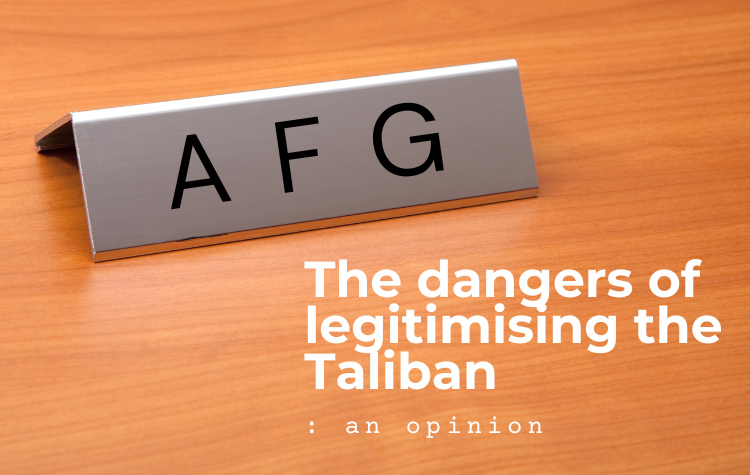
Written by: Ahmed Adam, FORUM-ASIA United Nations Advocacy Programme Manager
Nearly two years after the withdrawal of international forces in Afghanistan, the United Nations and the international community appear to be running out of options on how to effectively deal with the human rights and humanitarian crises intensified by the Taliban’s return to power.
The clearest indication of this were the recent remarks made by UN Deputy Secretary General Amina Mohammed, suggesting that a ‘discussion’ on the recognition of the Taliban ‘has to happen’ since the latter’s demand for recognition is the ‘leverage’ the UN has over the terror group.
Mohammed’s remarks make clear that the UN has neither the power nor a coherent and principled strategy to bring the Taliban in line other than to give in to their every demand. This risks empowering the Taliban.
Following the backlash and controversy, the UN appears to have backtracked Mohammed’s comments and insinuated that these comments were misinterpreted. The UN also indicated that there were no discussions about recognition at the closed-door UN Afghanistan summit in Doha in May.
The Taliban does not deserve any platform
Initiating a ‘discussion’ on the recognition of the Taliban would amount to a betrayal of the people of Afghanistan–especially women and girls–by the very global institution that has taken on itself to protect their fundamental rights and freedoms.
The Taliban’s takeover of Afghanistan–by brute force and violence–is clearly unconstitutional and without any democratic mandate, thus illegitimate. Suggesting ‘discussions’ regarding their recognition would go against the rule of law as well as the fundamental principles of human rights, justice, and fairness that the UN is mandated to uphold. It would also set a dangerous precedent that could embolden other groups to seek forcible seizure of power in other countries.
The Taliban’s ascent to power in Afghanistan may have already inspired other terrorist groups in the region. Lending them legitimacy and recognition could only exacerbate threats of violent extremism in Asia and beyond.
The mere expression of willingness to consider recognising the Taliban could send the wrong message: that the Taliban’s tactic of holding Afghan women hostage and killing anyone who does not agree with their ways is effective and acceptable in multilateral negotiations. This would then normalise gender apartheid and further entrench impunity.
What can be done instead of legitimising the Taliban
The international community–particularly the UN–should act immediately against the normalisation of the Taliban, and hold them accountable for their grave violations of human rights in Afghanistan
The Taliban should not be allowed to carry on committing crimes with impunity. Recognising or legitimising the Taliban is not an option.
The people of Afghanistan have repeatedly spoken against the recognition of the Taliban. Through joint letters, protests, and social media statements, Afghan civil society has made it abundantly clear that such discussions on recognition are completely at odds with what the people want or expect from the UN.
The single most important thing that the UN and the international community can do to counter the Taliban is to genuinely listen to the Afghan people and to let them drive the international strategy for their country.
For far too long, the people of Afghanistan have had no say in the running of their own country, their lives, and their future. They have been deliberately excluded from decision-making processes that directly impact their fundamental freedoms, particularly that of women and girls. As a result, the people of Afghanistan have suffered consequences of political negotiations and settlements between great powers.
Just as it had been in the past, the Taliban is now attempting to rule by force without the consent of the people of Afghanistan. The UN cannot repeat and prolong this vicious cycle.
The genuine inclusion of the people of Afghanistan in all political negotiations regarding the future of their country is the best leverage the UN could hope for.
Similarly, the UN needs to ensure that the Taliban’s crimes do not go unnoticed. The mandate of the UN Special Rapporteur on the situation of human rights in Afghanistan is crucial in this regard; however, it is not enough given the fundamental limitations of such mechanisms. To complement the important work of the Special Rapporteur, the UN should create an international mechanism that can systematically document, investigate, analyse, and preserve evidence of all crimes being committed in Afghanistan to a standard that is required for possible future criminal prosecutions of individual perpetrators. This could, at the very least, keep the hope of justice alive and possibly deter further crimes.
Recognising the Taliban is evidently against the wishes of the people of Afghanistan. It cannot be used as leverage to bargain away their fundamental rights and freedoms. It would only open the UN and the international community to negotiating with terrorists. Continued diplomatic engagements with terrorist groups that restrict people’s rights and pay zero attention to fundamental freedoms are seriously concerning not only for Afghans but for all human rights defenders around the world.



